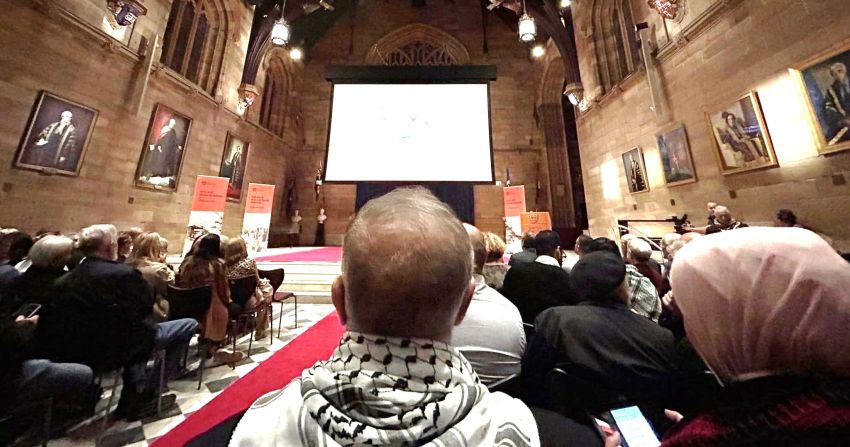
A symposium on the Palestinian catastrophe, held at the University of Sydney's Great Hall on September 5, was attended by many Labor and Green MPs, left parties, groups supporting Palestinian rights and Arab community members.
Twenty years ago, prominent Palestinian writer Dr Hanan Ashrawi, who had been awarded the Sydney Peace Prize, was prevented from giving a speech in the same venue. So there was a sense that things had progressed.
Former Labor foreign minister Bob Carr started with a factual description of Israel as an occupying force, a racist apartheid state and its presence in Palestine being illegal. He said what had happened to Palestinians in 1967 was a disaster and that recognition of Palestine was “taken for granted” by Labor.
While the symposium advertisement described the Palestinian Catastrophe as referring to “the devastation of the Palestinian homeland in 1949, and with it the displacement of the majority of Palestinian Arabs”, Carr recast it as a “setback of the 1967 war”.
This sleight-of-hand angered many in the audience, including many of his supporters. The Nakba is, for Palestinians, the greatest catastrophe and no one should accept its belittling.
Many Labor leaders say they recognise Palestine. But this does not mean they recognise Palestine as an independent state, only that they recognise the existence of Palestinian lands.
As for when Labor would recognise an independent Palestinian state, Carr said this would not happen before negotiations are resolved between Palestinians and Israel.
If Carr and other Labor leaders talk about Israel being an occupying force in Palestine, they must also recognise that the Palestinians living under occupation have the right to resist.
This is one of the most important of all human rights.
I asked Carr about this. He replied that he rejected all “Palestinian violence” and that violence will not achieve anything. He said Australia will never support violent resistance.
He implied that this is why all Palestinian armed organisations will remain on the prohibited “terrorist organisations” list.
Labor governments continue listing Palestinian resistance groups as “terrorist organisations” while allowing armed Australian-Zionist organisations, accused of killing Palestinians in the West Bank, to organise here.
Some Zionist groups organise annual tours to Israel and some focus their tours on Zionist settlements in the Hebron area. A tour organised by Bnei Akiva Australia invites students to spend two weeks living on an army base, or on a kibbutz.
Hashomer Hatzair Australia organises annual tours of Zionist settlements in the Jerusalem area. A Melbourne gym even recruits members for the Israeli army.
Dual citizens of Australia and Israel can serve in the Israel Defense Forces. But dual nationals of a country with which Australia does not have close defence ties would be closely scrutinised for doing the same, or be criminalised.
Carr said the expansion of Israeli settlements is illegal, but then also said some in the West Bank are “legal settlements”. He said this will be important to resolve in the final negotiations between the Palestinians and Israel. He did not mention Jerusalem, Israel’s siege of Gaza, or Palestinian refugees’ right of return.
Journalist Sophie McNeill and lawyer Rawan Arraf spoke about the need to find radical solutions, including ending the occupation and the suffering of Palestinians.
Professor Stuart Rees did a good job moderating, despite some loud condemnation of Carr’s comments.
Also provocative was the last-minute inclusion of La Trobe University Professor Joe Camilleri, who spoke about the need for dialogue between the Arab and Israeli communities. He argued that “listening to the other side” will help us see the “whole picture” and search for “real and lasting solutions”.